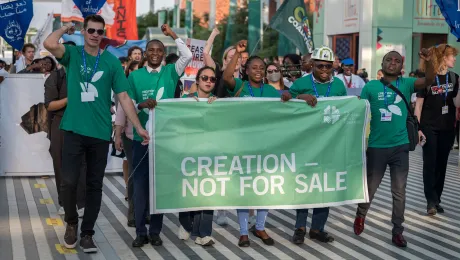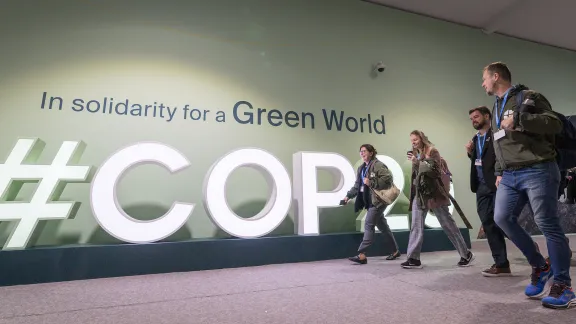
LWF delegates to COP29 walk through the venue in Baku, Azerbaijan. Photo: LWF/Albin Hillert
Delegates reflect on their work at COP 29 and share their expectations
(LWI) - COP29 is entering its final stages. Onsite and online, The Lutheran World Federation (LWF) delegates – including young people from member churches around the globe, church leaders, representatives of the LWF Climate Justice taskforce, as well as staff from LWF World Service country programs – are pushing for just solutions to a crisis that is ultimately set to impact all.
Dubbed a ‘finance COP’, a key element to resolve at COP29 is agreement on a new climate finance target, a so-called New Collective Quantified Goal (NCQG) – an opportunity to agree on a financial target that is aligned with the real needs of the most vulnerable countries and which includes three essential pillars in climate response: mitigation, adaptation and loss and damage.
Yet points of contention abound in how financing should be secured in a way that both provides the money needed for the most affected communities – predominantly in developing countries – not to be left stranded, and for these nations not to be forced into harmful debt traps.
Bringing voices from the ground to the table
A core aspect of LWF’s methodology for climate justice work is the linkage between the local and the global levels – bringing to the table the voices of people affected directly on the ground.
For Erick Kapira, Evangelical Lutheran Church in Tanzania, the role of the church in addressing climate change is clear: “Churches and other faith communities must be at the forefront in looking for solutions to climate change,” he said, bringing forth a positive example from his home context.
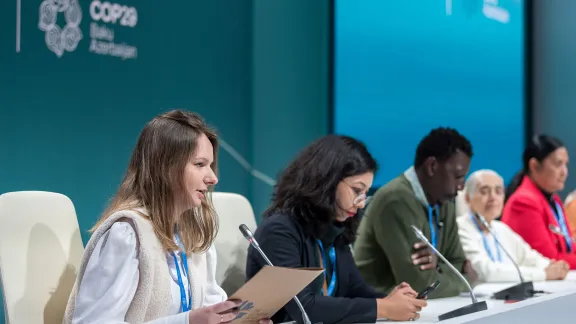
Carine Wendland from Brazil speaks at a press conference during COP29. Photo: LWF/Albin Hillert
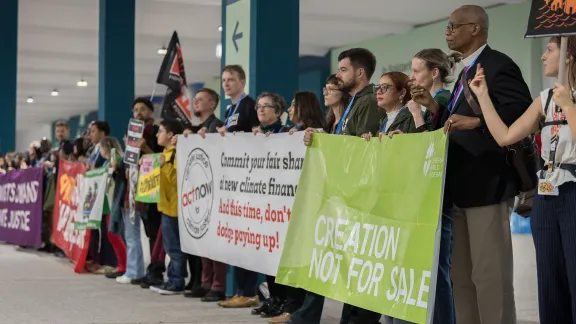
LWF delegates alongside Anglican Archbishop Julio Murray from Panama (right) and representatives from ACT Alliance (left) join 'a human chain' as part of a Global Day of Action outside the main plenary halls of COP29. Photo: LWF/Albin Hillert
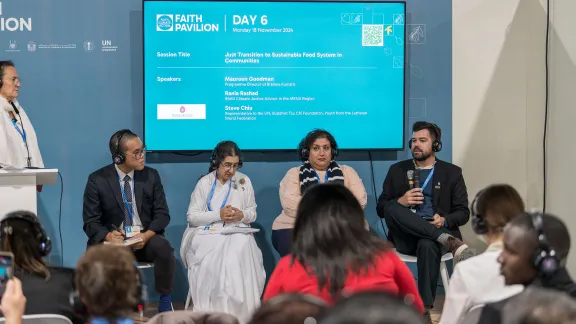
Romario Dohmann speaks at an interfaith side-event during the climate summit in Baku. Photo: LWF/Albin Hillert
“In Tanzania, the church preaches on climate justice, and the youth every day are practicing for example through planting mangrove trees, emphasizing to the communities to use renewable energy in order to protect our Earth, and so the church is in the forefront taking action,” he explained.
For LWF delegate Carine Wendland, it has been a busy second week of negotiations, with speaking engagements at a COP29 interfaith press conference, as well as both intergenerational and interfaith dialogues. “For me, the climate issue is made up of many challenges, but maybe the biggest is planting and cultivating a consciousness of care,” said the Synodal Youth Coordinator for the Evangelical Church of the Lutheran Confession in Brazil and a member of the LWF Climate Justice Forum for Latin America and the Caribbean.
“We have seen the climate emergency provoking climate anxiety or eco-anxiety in young people and we know that it is not just a cause for us, for young people, but for all generations,” Wendland noted.
Noting that 2024 is expected to make its mark as the first year recorded as hotter than 1.5 degrees Celsius above pre-industrial levels, she concluded: “I hope and we all hope that this will be a COP that moves beyond empty words and promises to a sustainable and fair financing structure, with coherent actions and socio-environmental justice for all forms of life.”
Interfaith element essential in pushing the agenda forward
Interfaith engagement forms an integral part in the LWF delegation’s work at the COPs each year, which includes the presentation to the UNFCCC of an interfaith declaration developed across faith traditions. And while faith representatives may enter COP with different thematic focus areas, the end goal remains the same: to care for Creation.
One who works daily in efforts to both mitigate and adapt to climate change as it hits local communities is Romario Dohmann of the Evangelical Church of the River Plate, an LWF member church in Argentina.
We know that climate change knows no borders or limits, but its impacts disproportionately affect the most vulnerable
Romario Dohmann of the Evangelical Church of the River Plate (Argentina)
“We know that climate change knows no borders or limits, but its impacts disproportionately affect the most vulnerable,” he said, highlighting the example of small-scale farmers during an interfaith side-event to the COP.
“They face enormous challenges due to reduced harvests or, in the worst cases, complete crop failures. This is why concrete actions, such as planting trees and restoring ecosystems, are essential to ensure their survival and build a sustainable future,” he explained and added: “Planting a tree today is not just an act of hope but an urgent climate action that can make a difference for future generations.”
“Our work is both about the direct push for ambitious and achievable goals, and a long-term effort to accompany young people on their journey as climate justice advocates,” LWF Program Executive for Climate Justice Elena Cedillo Vargas reflected. “If we fail to agree on the level of ambition needed at this COP, countries risk falling short of their commitments to limit global warming to below 1.5°C. An ambitious outcome is not only necessary, it is urgent. The time for action is here and now,” she added.
“With countries so far falling short of the level of commitment needed to address the climate emergency, COP29 must ensure clear accountability and a high level of ambition that translates into meaningful action to safeguard the future of our common home and all of us who are part of it,” Cedillo concluded.
The LWF delegation to COP29 comprises church leaders—men, women and youth—from all continents, advocating for the most vulnerable people from a faith perspective. They join efforts with ecumenical and interfaith partners in online and face-to-face meetings.
